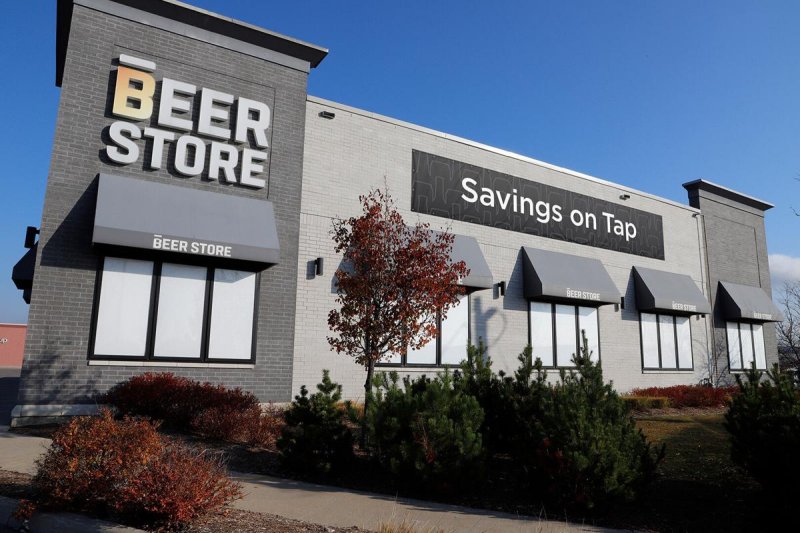The Beer Store, a fixture in Ontario's alcohol retail landscape, is undergoing a significant transformation. In a move that reflects the evolving dynamics of the beverage industry, the company has announced another wave of store closures across the province. This announcement marks the latest chapter in a year of significant changes for the chain, leaving many wondering about the future of The Beer Store and its role in Ontario's communities.
The latest announcement, made on June 9th, confirms that ten additional locations will be shuttered for good, effective August 10th. This news follows a series of closures earlier in the year, painting a picture of a company adapting to a shifting marketplace. The cumulative effect of these closures is being felt by both consumers and employees, prompting questions about access to beer and the economic impact on affected communities.
A Challenging Year for The Beer Store
The Beer Store has faced a challenging year, marked by a series of store closures that have raised concerns about the company's long-term viability. As of February 2025, 23 locations had already been closed, and in the months that followed, an additional 18 stores joined the list. This latest announcement of 10 more closures brings the total number of stores slated to close this year to a substantial figure, indicating a significant restructuring of the company's operations.
This wave of closures has prompted various reactions, from loyal customers lamenting the loss of a familiar shopping experience to employees facing job uncertainty. The company has cited a variety of factors contributing to the closures, including changing consumer preferences, increased competition from other retailers, and the need to optimize its operations for greater efficiency.
Understanding the Reasons Behind the Closures
Several factors are contributing to The Beer Store's decision to close these locations.
- Changing Consumer Preferences: Modern consumers are increasingly drawn to convenience and variety. They're looking for broader selections, longer operating hours, and the ability to purchase alcohol alongside their groceries. The Beer Store, with its more limited product range and store hours, may not be fully meeting these evolving demands.
- Increased Competition: The alcohol retail landscape in Ontario is becoming increasingly competitive. The expansion of beer and wine sales into grocery stores and other retail outlets has presented consumers with more choices and convenient alternatives to The Beer Store. This increased competition has undoubtedly put pressure on The Beer Store to adapt and streamline its operations.
- Operational Efficiency: In a competitive marketplace, businesses must constantly strive for efficiency. The Beer Store is likely evaluating its entire network of stores and identifying locations that are underperforming or no longer align with its strategic goals. Closing these locations allows the company to consolidate its resources and focus on its most profitable operations.
The Impact of the Closures
The closure of these Beer Store locations will have a multi-faceted impact on various stakeholders.
- Consumers: The most immediate impact will be felt by consumers who relied on these stores for their beer purchases. They will need to find alternative locations, potentially traveling farther or adjusting their buying habits. In some communities, the closure of The Beer Store may reduce access to beer, particularly for those without reliable transportation.
- Employees: The closures will inevitably lead to job losses for employees working at the affected stores. This can have a significant impact on their livelihoods and the local economies of the communities where they reside. The Beer Store has an obligation to provide support and resources to these employees during this transition, helping them find new employment opportunities.
- Local Communities: The closure of a Beer Store can also impact the local community. These stores often contribute to the local economy through property taxes and employment. Their closure can leave a void in the retail landscape and potentially affect the vitality of the surrounding area.
What Does the Future Hold for The Beer Store?
The recent wave of closures raises questions about the future of The Beer Store and its role in Ontario's alcohol retail market. The company will need to adapt to the changing landscape to remain competitive and relevant. This may involve:
- Modernizing the Retail Experience: The Beer Store needs to invest in modernizing its stores to create a more appealing and convenient shopping experience. This could include expanding its product selection, improving store layouts, and offering online ordering and delivery options.
- Enhancing Customer Service: Providing exceptional customer service can help The Beer Store differentiate itself from its competitors. Training employees to be knowledgeable, helpful, and responsive to customer needs can create a more positive shopping experience and build customer loyalty.
- Focusing on Key Markets: The Beer Store may need to focus its resources on key markets where it has a strong competitive advantage. This could involve closing underperforming stores in less strategic locations and investing in stores in high-traffic areas with strong customer demand.
- Exploring New Partnerships: Collaborating with other businesses, such as grocery stores or restaurants, could help The Beer Store expand its reach and offer its products to a wider audience.
Government's Role in Ontario's Alcohol Retail Landscape
The Ontario government also plays a crucial role in shaping the future of the alcohol retail landscape. Government policies and regulations can significantly impact the competitiveness of The Beer Store and other retailers. The government should consider:
- Leveling the Playing Field: Ensuring that all alcohol retailers operate under a level playing field can promote competition and benefit consumers. This may involve reviewing regulations related to pricing, product selection, and store hours to ensure that they are fair and equitable.
- Supporting Local Businesses: Providing support to local breweries and wineries can help them thrive and contribute to Ontario's economy. This could involve reducing taxes, streamlining regulations, and promoting Ontario-made products.
- Promoting Responsible Consumption: The government has a responsibility to promote responsible alcohol consumption and prevent alcohol-related harm. This can be achieved through education campaigns, stricter enforcement of impaired driving laws, and responsible retailing practices.
Conclusion
The Beer Store's recent closures reflect the dynamic and evolving nature of the alcohol retail market in Ontario. The company faces significant challenges, including changing consumer preferences, increased competition, and the need to optimize its operations. To remain competitive, The Beer Store must adapt to the new landscape by modernizing its retail experience, enhancing customer service, and focusing on key markets. The Ontario government also has a crucial role to play in shaping the future of the alcohol retail landscape by leveling the playing field, supporting local businesses, and promoting responsible consumption. Only through collaboration and innovation can Ontario ensure a vibrant and sustainable alcohol retail market that benefits consumers, businesses, and communities across the province. The coming months will be critical in determining whether The Beer Store can successfully navigate these challenges and maintain its position as a key player in Ontario's beverage industry.
Word Count: 1,217

Megan Morris
Meghan Morris is not just a freelance writer - she is a force to be reckoned with in the world of writing. When Meghan isn't immersed into her writing, she dedicates her time and energy to her role as an Activation Coordinator. Apart from her writing and career, Meghan is also a passionate traveler and a self-proclaimed movie lover.






Leave a comment?
To write a comment, you must login or register first.